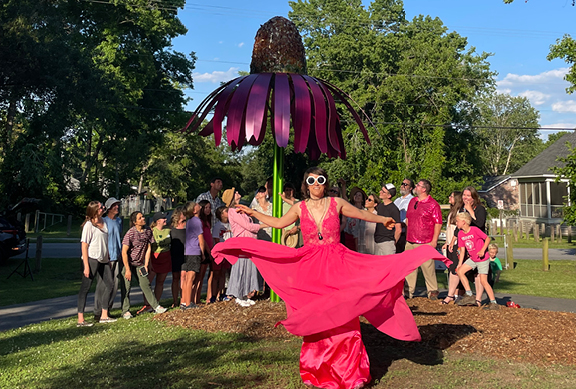New large-scale art installation on the West Ashley Bikeway aims to wow and educate
by Lorne Chambers | Editor
“TuxedoKat” is more than a moniker, it’s a state of mind for North Carolina-based artist, producer, and entrepreneur Katlyn Cornelius. She has adopted the name as kind of her artist alter-ego, if you will, often speaking of TuxedoKat as if it is something autonomous, separate from her. Yet, it is an intrinsic part of her.
“[TuxedoKat] is free-flowing imagination mixed with unrelenting ambition. It is tangible works of art and opted-in experiences. It is choosing to feel it all and feeling sorry for none of it,” she states on her website. And when Cornelius talks about her artwork, she often refers to it as the work of TuxedoKat. She specializes in glass art, commercial art design, large-scale sculptures, upcycle arts, art-based mindfulness workshops, and community building through producing public art.
Cornelius (a.k.a. TuxedoKat) was in town recently to unveil her new sculpture “Pollinator Paradise” which was commissioned by the Charleston Parks Conservancy (CPC) after seeing her work on display in 2023 at Artfields, a 10-day festival in Lake City, SC, where the entire small town is transformed into a city-wide art gallery with hundreds of piece of are displayed in more than 40 venues around its downtown.
TuxedoKat’s rainbow glass sculpture, Meta Towers, was on display at the Lake City Library during the competition. CPC reached out to TuxedoKat and invited her to Charleston to tour its Community Gardens on Magnolia Road in West Ashley as a potential location for a public art installation.
“CPC mentioned wanting to create a space that would capture the attention of walkers and drivers by the West Ashley Bikeway, as well as offer a gathering and educational feature,” recalls TuxedoKat.
While there, the artist says she learned about the importance of bees to humanity. In the “pollinating” area of the garden, where specific flowers were planted to attract pollinating bees, she became captivated by a beautiful echinacea flower bush with colorful magenta petals surrounding a blossoming cone. Imagining herself as a tiny object beneath the towering flowers, TuxedoKat became inspired.
“This was the moment when the idea for the giant coneflower, Pollinator Paradise, sprang to life,” she says.
CPC chose to work with TuxedoKat largely because the organization was captivated by the style she implemented with Meta Towers, where the sides of the towers glowed with illuminated pieces of broken and crushed glass from recycled items like glass bottles and thrifted, unwanted items such as plates and vases. TuxedoKat says she placed each piece in a mosaic fashion, creating a spectrum gradient of glass while coordinating the internal lighting to complement the glass colors. Since, this glass technique was highly desired by the CPC for their new sculpture, TuxedoKat decided that the cone of the Pollinator Paradise sculpture would be made with pieces of glass, while the petals and structure would be fabricated from metal.
TuxedoKat says her husband, David, who has over a decade of experience in selling and estimating large commercial signage, played a crucial role in the Pollinator Paradise project. He teamed up with Sign Art, a company in Concord, N.C., to assist his wife in making the sculpture large enough to create the feeling of being “as tiny as an ant” for the observer while admiring the large structure.
David’s expertise guided the project through the design, fabrication, and installation phases. Additionally, the sculpture was engineered to withstand hurricane-force winds, ensuring its durability and longevity.
TuxedoKat hopes Pollinator Paradise will be a statement piece that captivates with its rich textures, unconventional mediums, and visual allure from afar. As visitors approach and move beneath the petals, they discover intricate patterns that are perfect for photoshoots.
“The sun illuminates the colors of the broken glass in the cone, which includes amber, orange, yellow, red, green, and gold. At night, shining a light onto the cone illuminates the glass, making it perfect for fun nighttime and light painting photography,” says TuxedoKat. “We hope people will dress up and take pictures with the sculpture at various times of the day—day, night, and during the magic hour.”
Pollinators Paradise will undoubtedly attract all sorts of photographers. If the subject is positioned just right in front of the sculpture, the camera can capture an angle that makes the subject appear larger than the sculpture, creating a perspective illusion as if they are holding it in their hands, says TuxedoKat.
Besides being a beautiful work of art and a great backdrop for a photoshoot, TuxedoKat says Pollinator Paradise also aims to educate visitors whose curiosity will draw them closer.
“Beyond its aesthetic appeal, this sculpture serves as a tangible reminder of the vital role that pollinators, especially bees, play in our ecosystem,” she says. “By creating captivating artwork centered around pollination, we hope to spark conversations and raise awareness about the importance of protecting these essential creatures and their habitats.”
TuxedoKat hopes this is just the beginning of more art installations along the West Ashley Bikeway. She thinks the sculpture is large enough to be considered a Roadside Attraction, similar to the world’s largest ball of string. “This would be the world’s largest coneflower! We hope it creates buzz for the local businesses in the area,” says TuxedoKat. “Art has always been an activating force for individuals, spaces, and communities. Investing in art can be challenging because it requires funding to create and may not generate direct financial returns once installed. However, setting aside the business perspective, the power of public art lies in its ability to inspire those who encounter it.”














